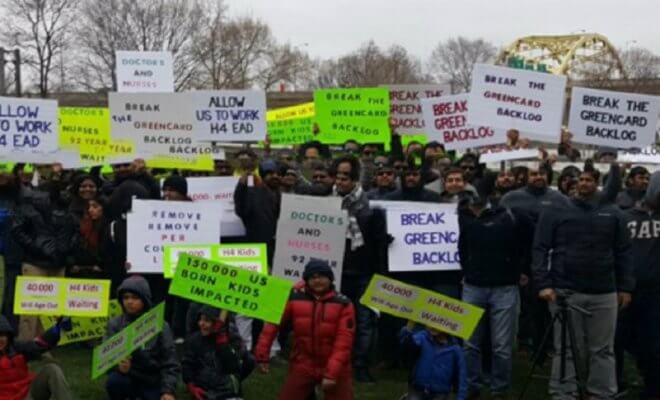Immigration
Indian American IT Workers Demand End to Green Card Backlog

The rally in Pittsburgh, Pennsylvania
Photo: Twitter
Indian American IT professionals held rallies at New Jersey and Pennsylvania to ask for end to per-country green card quota.
Several Indian American professionals from the IT industry held rallies in the United States over the weekend to demand scrapping of the huge backlog in green card allocation. The demonstrators asked for an end to the per-country limit in two rallies held in New Jersey and Pennsylvania, PTI reported.
“It’s high time the Congress, Senate and White House administration works on this issue and solves the problem of high skilled immigrants,” GCReforms, the organizers of the rallies said, according to the report.
The rally, called #BreakTheBacklog campaign, saw participants coming out in full force on a cold day. They displayed posters, with slogans such as, “Remove Per Country Limits for employment-based Green cards” and “300,000 waiting for 90 years.”
GCReforms.Org, founded by members of the Indian diaspora living in the United States, focuses on creating awareness about immigration challenges faced by Indian high-skilled workers.
It also took to the social media to post updates about the rallies.
TY speakers @sanjaychopra99 of @CognistX & @pittstechaudrey at Fantastic #BreakTheBacklog event in PA
Time for @SenateDems & @SenateGOP to treat #LegalImmigrants fair.
@RepKevinYoder #HR392 @SenMikeLee #S281 https://t.co/eiUhoq8xIlhttps://t.co/ps1CdjrhEWhttps://t.co/xin6tdaSnE pic.twitter.com/9AFtvnhTHj— Green Card Reforms (@GcReforms) April 30, 2018
GCReforms states on its website that thousands of skilled workers from India, and their families, have to wait for several decades to get their green card due to arbitrary per country limits. “They face many risks and challenges as they wait for their green card. We are working to advocate for a fair skill based green card allocation process that does not discriminate based on country of birth,” it adds.
Indian Americans, who are mostly high-skilled workers, arrive in the United States primarily on H-1B work visas. They suffer the most due to the current immigration system as it imposes a seven per cent per country quota for the allotment of green cards or permanent legal residency. This results in a long wait period to get green card.
The waiting period for skilled Indian workers who are EB-3 applicants is more than 10 years, according to a report from the Republican Policy Committee of the United States released in February. The number of green cards issued to people directly based on their skills, experience, and education and on the needs of the employers in the United States is closer to 6 percent of the overall total, the report said.
A large congregation of Indian Americans staged a march outside the White House on Feb. 3, supporting the United States President Donald Trump’s proposal to implement a “merit based” immigration system in the country.




1 Comment
You must be logged in to post a comment Login